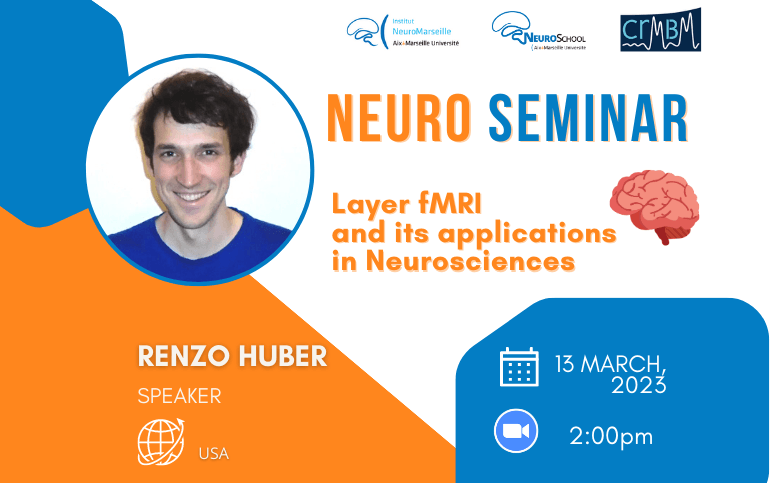
NeuroSchool seminar: Renzo Huber
Layer fMRI and its applications in Neuroscience
Monday, March 13th, 2023, the NeuroSchool PhD Program will invite Renzo HUBER, staff scientist at the FMRIF, NIH, Bethesda, USA, for a seminar entitled “ Layer fMRI and its applications in neuroscience“.
In this seminar, I want to talk about the developing field of cortical layer-specific fMRI in humans.
I will start by introducing the practical challenges of high-resolution fMRI at ultra high fields and recent developements to use these tools for capturing neural processes within and across cortical layers. For the main part of the presentation, I will give an overview of recent neuroscientific application studies of blood volume weighted layer-fMRI, across a wide spectrum of cortical brain systems. These applications will be discussed with respect to understanding principles of data acquisition, data processing and neuroscientific interpretability.
Monday, March 13, 2023, Online
The schedule is as follows:
- 11:00 am – Discussion among students to discuss the papers – For PhD students only – online
- 2:00 pm – Seminar – Open to all – online
- 3:00 pm – Special discussion time with the speaker for PhD students – online
📢 PhD students: register on AMETICE for your hours to be counted. Attendants get 3 hours, chairpersons 4 hours.
Register to Renzo Huber seminar and receive the zoom link
Our speaker
Between 2019 and 2022, Renzo was an assistant Professor and VENI-Fellow in MR-Methods, Cognitive Neuroscience, Maastricht Brain Imaging Center, Faculty of Psychology and Neuroscience, University of Maastricht. In November 2022, Renzo joined the Functional Magnetic Resonance Facility at the National Institutes of Health in Bethesda MD, USA as a Staff scientist.
MR-sequence improvements in the last decade have allowed ultra-high resolutions to probe the basic neural building blocks of cortical layers and columns. Mapping the activity within these sub-millimeter structures can open the door to investigating mesoscale neural circuitry and shed light on the biological mechanisms in humans using non-invasive methods. In his research, Renzo aims to push past the constraints of high-resolution fMRI to take it from methods-focused proof-of-principle studies to solutions for routine neuroscience practice that are usable by non-MRI experts. In his PhD at the Max Planck Institute in Leipzig, he developed an imaging contrast that is sensitive to cortical microvasculature and combined it with efficient MR readout techniques. During his postdoc at the NIH, he optimized and applied this layer-specific VASO-fMRI in proof-of-principle studies addressing basic neuroscience questions under the supervision of Peter Bandettini. He showed in human volunteers that motor output emerges from layer 5 neurons, while sensory-motor feedback terminates in layers 2/3. Similarly, he was also able to show working memory information processing in superficial layers of the dorsolateral prefrontal cortex and prediction error calculations in feedback layers of the primary somatosensory cortex. In 2018, Renzo was awarded a Dutch VENI Fellowship to further advance the layer-fMRI methodology and prepare it for the mass market. As an asst. Professor at Maastricht University, he developed the first whole-brain layer-fMRI protocol, which significantly simplifies the experimental planning efforts. This layer-specific fMRI sequence takes the investigation of brain circuitry in humans up to a whole new level.









